GLP-1 Medications are too powerful to prescribe over chat
GLP-1 Medications are
too powerful to prescribe
over chat
GLP-1 medications require expert guidance. Unsupervised GLP-1 use has been shown to cause substantial muscle loss and worse rebound weight gain after use. Both can lead to future health issues. We support you physically and mentally — so you can shed weight safely while adapting and thriving through your transformation.
Average amount of weight lost using GLP-1 medications is 18-22%, depending on the specific drug
The percentage of patients on GLP-1 medications experience side effects requiring treatment, with 10% facing serious side effects.
Nearly half of the weight lost with GLP-1 medications can come from lean body mass, not fat, affecting your strength and metabolism.
The many
benefits of GLP-1 Medications
Glucagon Like Peptides-1 (GLP-1) Agonist medications, originally developed for Type 2 diabetes, have shown to have a number of other potential benefits, particularly in managing obesity.
-
Lowers blood pressure
-
Improves fatty liver disease and liver inflammation
-
Obesity can lead to heart diseases like high blood pressure and heart attacks, as excess fat strains the heart and clogs blood vessels.
-
Guts: Reduces the pro-inflammatory cytokines in the guts.
-
Heart: Reduces vascular inflammation and oxidative stress by improving endothelial function
-
Brain: Improves inflammatory markers in brain and could improve the risk of Alzheimer’s*
-
Reduces overeating
-
Improves alcohol consumption-related behaviors
-
Weight loss reduces wear and tear on weight bearing joints
-
Can improve joint aches and pains
-
Weight loss significantly improves obstructive sleep apnea
-
Improves energy levels
Available GLP-1 Medications In The U.S.
Glucagon-Like Peptide-1 (GLP-1) agonist medications are approved for the treatment of Obesity and Type 2 Diabetes Mellitus under various brand names.

Wegovy® (Semaglutide)
Wegovy is FDA-approved for chronic weight management in adults with obesity or overweight and a weight-related condition. It’s a once-weekly injection that helps regulate appetite by mimicking natural GLP-1 hormones, making it easier to feel satisfied with less food. When paired with lifestyle changes, Wegovy can lead to clinically meaningful and sustained weight loss
Cash price: $650 monthly (charged every 28 days)
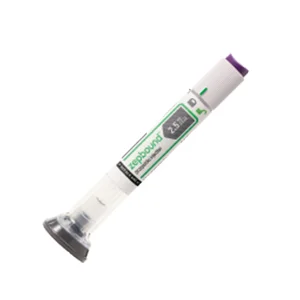
Zepbound™ (Tirzepatide)
Zepbound is a recently FDA-approved medication for weight management. It leverages the dual action of GLP-1 and GIP receptor agonism to enhance metabolic health, reduce appetite, and promote significant weight loss. Clinical trials have shown its potential to transform care for individuals with obesity or overweight, offering new hope for effective, long-term weight control.
Cash price: $750 monthly (charged every 28 days)

Compounded Semaglutide
Compounded Semaglutide is a customized alternative to branded versions, often prescribed for patients seeking affordable options for weight loss or metabolic health management. Prepared by specialized compounding pharmacies, these formulations provide flexibility but should be sourced from reputable providers under medical guidance to ensure safety and effectiveness.
Cash price: $250 monthly (charged every 28 days)

Compounded Tirzepatide
Compounded Tirzepatide offers access to the same active ingredients found in medications like Mounjaro or Zepbound but is tailored by compounding pharmacies. It can be an accessible solution for patients pursuing weight loss with medical oversight, emphasizing the importance of quality and personalized care.
Cash price: $350 monthly
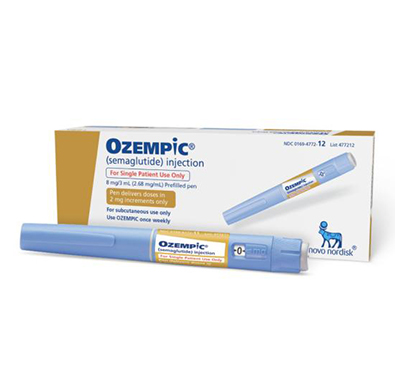
Ozempic® (Semaglutide)
Primarily used to treat type 2 diabetes, Ozempic is FDA-approved for improving blood sugar control and reducing cardiovascular risks in adults. While not officially indicated for weight loss, many patients have experienced significant reductions in body weight, making it a widely recognized option for dual metabolic benefits.
Cash price: $650 monthly (charged every 28 days)
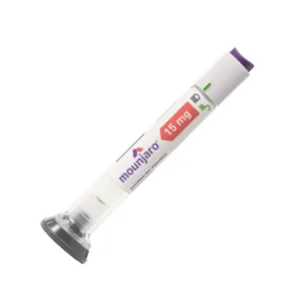
Mounjaro® (Tirzepatide)
Mounjaro is FDA-approved for managing type 2 diabetes and stands out with its unique mechanism of action targeting both GIP and GLP-1 receptors. Beyond its outstanding ability to improve blood sugar levels, it has delivered remarkable weight loss results in trials, offering a promising option for comprehensive metabolic care.
Cash price: $750 monthly (charged every 28 days)
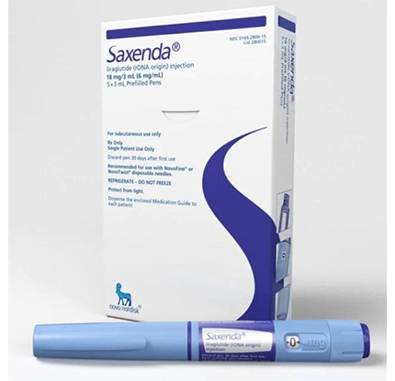
Saxenda® (Liraglutide)
Saxenda is FDA-approved for weight management in adults with obesity or overweight and at least one related health condition. Taken as a daily injection, it works by enhancing the feeling of fullness and reducing hunger. Saxenda is most effective when combined with a healthy diet and regular physical activity, offering a proven path to sustained weight loss.
Cash price: $900 monthly (charged every 28 days)
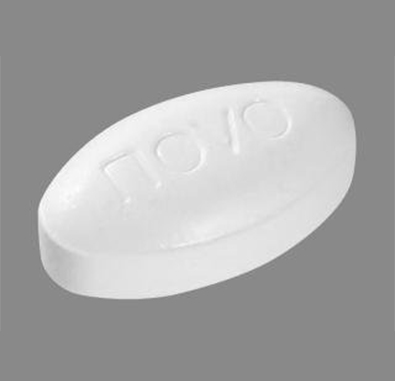
Rybelsus® (Semaglutide)
Rybelsus is the first oral GLP-1 receptor agonist approved for type 2 diabetes. Taken as a daily tablet, it offers a convenient alternative to injectable options while improving blood sugar control and supporting weight loss in many patients as part of their diabetes management plan.
Cash price: $600 monthly (charged every 28 days)

Trulicity® (Dulaglutide)
Trulicity is a once-weekly injectable medication FDA-approved for type 2 diabetes management. It helps regulate blood sugar and reduces the risk of cardiovascular events in patients with diabetes and heart disease. While weight loss isn’t its primary focus, many patients find it supports their overall health goals.
Cash price: $900 monthly (charged every 28 days)

Saxenda (Liraglutide)
Ozempic® (semaglutide) is a medication primarily used for managing type 2 diabetes in adults and for lowering the risk of major cardiovascular events, such as stroke, heart attack, or death in adults with type 2 diabetes who have heart disease. It's not currently FDA-approved for weight loss, but clinical trials have shown effectiveness in this area as well.
Cash price: $900 monthly (charged every 28 days)

Saxenda (Liraglutide)
Ozempic® (semaglutide) is a medication primarily used for managing type 2 diabetes in adults and for lowering the risk of major cardiovascular events, such as stroke, heart attack, or death in adults with type 2 diabetes who have heart disease. It's not currently FDA-approved for weight loss, but clinical trials have shown effectiveness in this area as well.
Cash price: $900 monthly (charged every 28 days)
Side effects: Minimized
GLP-1 medications can have serious side effects, especially with unsupervised use, but with experienced use and precise dosing, Aayu Well’s focus on safety will minimize adverse reactions.
Common side effects
Gastrointestinal discomfort (nausea, vomiting, diarrhea, abdominal pain, constipation), appetite changes, dizziness, and reactions at the injection site.
Serious concerns
Hypoglycemia (notably with other diabetes drugs), increased heart rate, hypotension, and anxiety.
Rare risks
Potential for thyroid cancer, pancreatitis, complications with diabetic retinopathy, allergic reactions, and kidney or liver issues.





